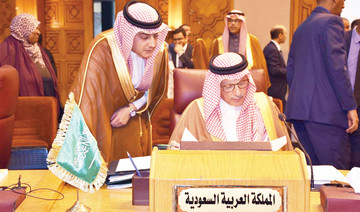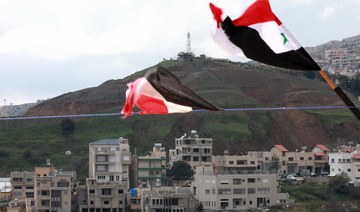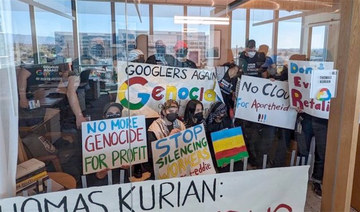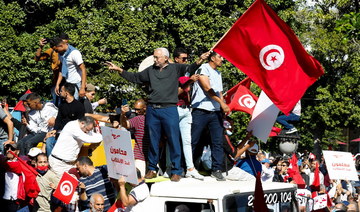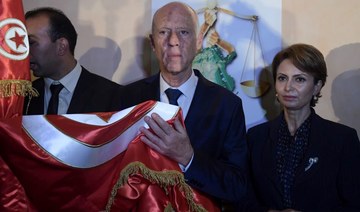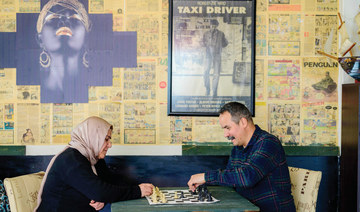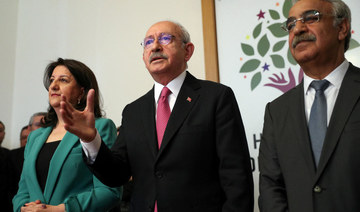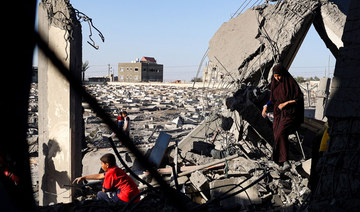SHILOH, WEST BANK: Deep in the West Bank, Israeli settlers have transformed an archaeological site into a biblical tourist attraction that attracts tens of thousands of evangelical Christians each year.
Tel Shiloh is believed to have been the site of the biblical tabernacle, but not everyone is pleased at how the ruins are presented to visitors.
Like many Holy Land sites, Tel Shiloh sits at the confluence of competing narratives of archaeology, religion, and nationalism. Critics say the site promotes a narrow interpretation of history popular with Israeli settlers and their Christian supporters.
The hilltop mound, 30 kilometres north of Jerusalem in the Israeli-occupied West Bank, has been excavated by several archaeological missions, starting in 1922, and has yielded remains spanning over 3,700 years.
For centuries, Jews, Muslims, and Christians have associated the site with the home of the biblical tabernacle, the portable shrine where the Israelites housed the Ark of the Covenant.
Because of its biblical significance, the archaeological ruins have become a pilgrimage site for evangelical Christians.
Last week, Prime Minister Benjamin Netanyahu visited Tel Shiloh with former Arkansas Gov. Mike Huckabee and settler leaders, calling it Israel’s “first capital.”
Huckabee, a television host with a strong evangelical following, tweeted that “Shiloh is proof from 3000 yrs ago this land was home to @Israel site of ancient Tabernacle.”
In 2009, Tel Shiloh hosted 30,000 visitors, 60 percent of whom identified as evangelical Christians, according to the Israeli government. In 2012, the government allocated about $4.2 million for a plan to preserve and upgrade the site, inaugurating a new visitors’ centre the following year.
Since its completion, Tel Shiloh — rebranded as Ancient Shiloh: City of the Tabernacle — has seen tourism skyrocket to around 120,000 visitors in 2018, said site director Lilyan Zaitman. Over half were evangelical Christians.
Unlike other major sites in the West Bank, Tel Shiloh is managed by the local settler council and Mishkan Shiloh, a private non-profit organization, rather than Israel’s Nature and Parks Authority.
The site is inside the Jewish settlement of Shiloh, founded after Israel captured the West Bank in the 1967 war. The tourist attraction is built on private Palestinian land but Palestinians are barred from entering, according to a recent Amnesty International report.
The Palestinians have demanded the West Bank as part of their future state, and most of the international community views the settlements as illegal.
The Second Protocol of the Hague Convention for the protection of cultural property prohibits archaeological excavations in occupied territory “save where this is strictly required to safeguard, record or preserve cultural property.” Israel is not one of the protocol’s 82 signatories.
Zaitman said visitors should understand that “the roots of the Jewish people began here,” calling it “the first capital city of the Jewish people before Jerusalem.”
Despite Tel Shiloh’s long and varied history, the site drives home its Jewish relevance, with little attention paid to other periods or peoples, whether Canaanite, Byzantine or Muslim. This has drawn criticism from archaeologists and activists.
Emek Shaveh and Yesh Din, Israeli NGOs, charged in a 2017 report on Israeli archaeology in the West Bank that Ancient Shiloh aims to “reinforce the connection between the biblical Shiloh and the modern settlement, in a manner not necessarily based on the archaeological discoveries at the site.”
The goal, they argue, is to “create a broad consensus about its importance as an indivisible part of the state of Israel.”
Among the ruins are three Byzantine-era churches and two mosques. One of the two historical mosques is located outside the archaeological park, while the second is unmarked and undeveloped for visitors. A Byzantine church has been reconstructed and serves as a venue for events.
A new three-dimensional “hologram” presentation entertains viewers with a representation of the tabernacle and a description of the rituals performed there, based on the Bible.
A small museum inside the visitors’ centre makes scant mention of nearly 1,400 years of Muslim rule, and a film depicting the site’s history deals exclusively with the biblical account.
The archaeological record, however, is more complicated.
Tel Aviv University archaeologist Israel Finkelstein led excavations at Tel Shiloh in the 1980s. He said there is evidence of continuous religious activity at the site for centuries leading up to the early Iron Age, the period associated with the emergence of the ancient Israelites.
“What exactly was the nature of the cult, whether there was a temple there, and also the exact location of this cult place at the site, is not very clear,” Finkelstein said. As with any archaeological site, Finkelstein said “our responsibility is to give the facts, and then we can of course say that there is more than one way to interpret the finds.”
No evidence of the tabernacle has been found, but archaeologists are looking. Excavations are being carried out by the Associates for Biblical Research, whose stated aim is “demonstrating the historical reliability of the Bible through archaeological and biblical research.”
Scott Stripling, head of the current excavation, is one of a handful of evangelical archaeologists currently excavating in the West Bank. Evangelicals are the only non-Israeli teams involved in West Bank digs. Except for Tel Shiloh, however, the others operate in conjunction with Israeli universities.
“We will likely be the largest excavation in Israel once again this summer,” Stripling said. Despite broad academic stigma involved with excavating in the West Bank, Stripling said his organization “is completely apolitical, and we would be excavating the same region, regardless of political changes.”
Rico Cortes, a tour guide from Orlando, Florida, who led a Spanish-speaking group through the site earlier this month, said Shiloh’s connection to the state of Israel is unquestioned.
“I bring everyone to respect Israel, the people and the Book,” he said. “The fact that the presence of God one time dwelled here is overwhelming.”
Ancient West Bank site draws Christians, and controversy
Ancient West Bank site draws Christians, and controversy
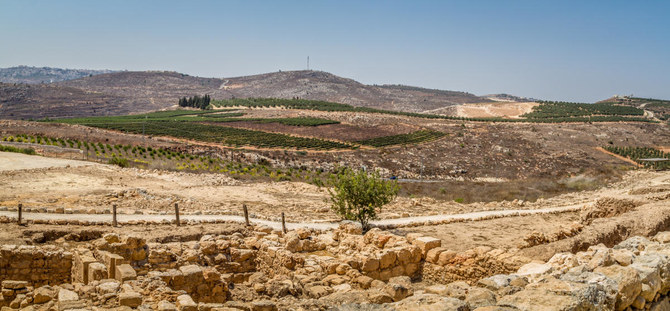
- Some people believe the portrayal of the site supports the Israeli narrative of history
- The biblical significance of the site makes it a pilgrimage location for evangelical Christians
UAE announces $544m for repairs after record rains
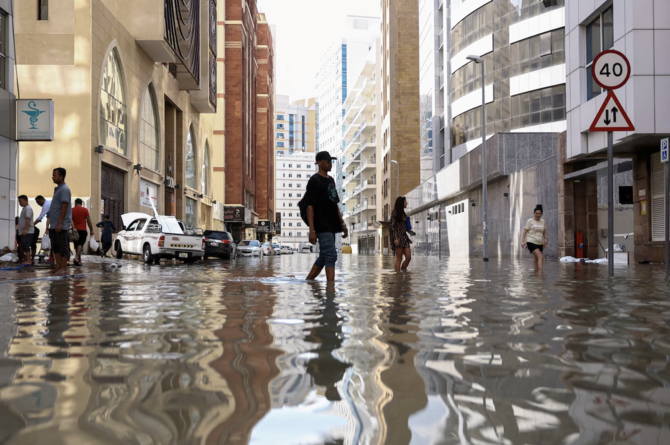
- Wednesday's announcement comes more than a week after the unprecedented deluge lashed the desert country
- “The situation was unprecedented in its severity but we are a country that learns from every experience,” Sheikh Mohammed said
DUBAI: The United Arab Emirates announced $544 million to repair the homes of Emirati families on Wednesday after last week’s record rains caused widespread flooding and brought the Gulf state to a standstill.
“We learned great lessons in dealing with severe rains,” said Prime Minister Sheikh Mohammed bin Rashid Al-Maktoum after a cabinet meeting, adding that ministers approved “two billion dirhams to deal with damage to the homes of citizens.”
Wednesday’s announcement comes more than a week after the unprecedented deluge lashed the desert country, where it turned streets into rivers and hobbled Dubai airport, the world’s busiest for international passengers.
“A ministerial committee was assigned to follow up on this file... and disburse compensation in cooperation with the rest of the federal and local authorities,” said Sheikh Mohammed, who is also the ruler of Dubai, which was one of the worst hit of the UAE’s seven sheikhdoms.
The rainfall was the UAE’s heaviest since records began 75 years ago.
Cabinet ministers also formed a second committee to log infrastructure damage and propose solutions, Sheikh Mohammed said in a post on X, formerly Twitter.
“The situation was unprecedented in its severity but we are a country that learns from every experience,” he said.
The storm, which dumped up to two years’ worth of rain on the UAE, had subsided by last Wednesday.
But Dubai faced severe disruption for days later, with water-clogged roads and flooded homes.
Dubai airport canceled 2,155 flights, diverted 115 and did not return to full capacity until Tuesday.
Israeli army strikes 40 Hezbollah targets in south Lebanon
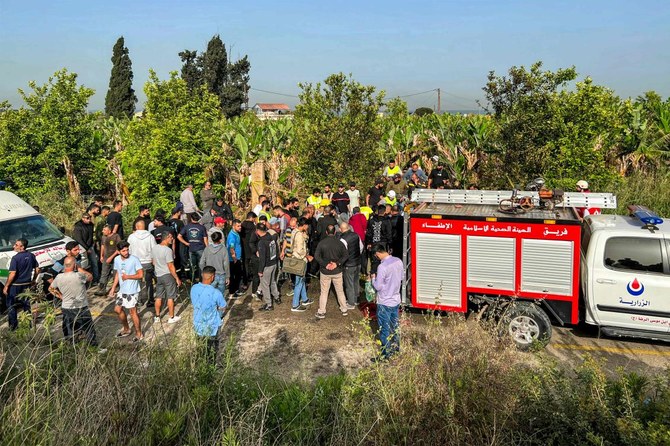
- Hezbollah has exchanged near-daily fire with the Israeli army
- Israel says 11 soldiers and eight civilians have been killed on its side of the border
Beirut: The Israeli army said Wednesday it struck 40 Hezbollah targets in southern Lebanon as near-daily exchanges of fire rage on the border between the two countries.
“A short while ago, IDF (army) fighter jets and artillery struck approximately 40 Hezbollah terror targets” around Aita Al-Shaab in southern Lebanon, including storage facilities and weaponry, the army said in a statement.
Lebanon’s Iran-backed Hezbollah movement said it fired a fresh barrage of rockets across the border earlier in the day after a strike blamed on Israel killed two civilians.
The group had already fired rockets at northern Israel late on Tuesday “in response” to the civilian deaths.
Hezbollah has exchanged near-daily fire with the Israeli army since its ally Hamas carried out an unprecedented attack on Israel on October 7, triggering war in Gaza.
It has stepped up its rocket fire on Israeli military bases in recent days.
Hezbollah fighters fired “dozens of Katyusha rockets” at a border village in northern Israel “as part of the response to the Israeli enemy’s attacks on... civilian homes,” the group said in a statement.
On Tuesday, rescue teams said an Israeli strike on a house in the southern village of Hanin killed a woman in her fifties and a girl from the same family.
Since October 7, at least 380 people have been killed in Lebanon, mostly Hezbollah fighters but also 72 civilians, according to an AFP tally.
Israel says 11 soldiers and eight civilians have been killed on its side of the border.
Tunisia law professors call for release of detained opposition figures
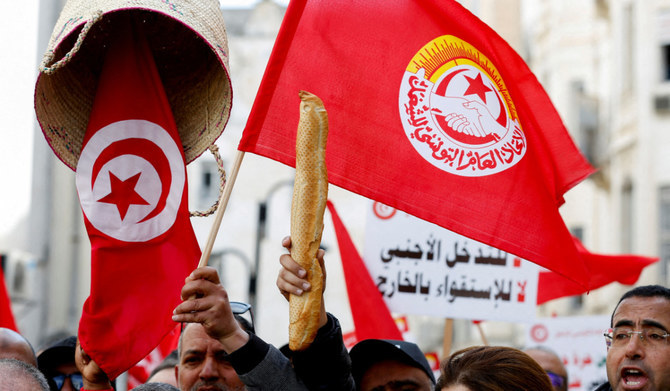
- Since a flurry of arrests in February 2023, around 40 critics of President Kais Saied have been facing charges of “conspiracy against the state“
- Eight of the critics have been detained since, and have yet to see trial
TUNIS: More than 30 Tunisian law professors on Wednesday called for the release of several political opposition figures arrested last year, pointing out that the 14-month legal limit for pre-trial detention had passed.
Since a flurry of arrests in February 2023, around 40 critics of President Kais Saied have been facing charges of “conspiracy against the state.”
Eight of the critics have been detained since, and have yet to see trial.
They were expected to be released earlier this month after their detention was extended twice — four months each time — following an initial six-month stint, their lawyers said.
Yet all eight remain in detention after a court hearing on their case was put off until May 2.
This means they have been detained for more than 14 months without trial, which is the limit under Tunisian law.
“Keeping them in prison beyond the period of preventive detention is a violation (of Tunisian law),” read a statement signed by 33 law professors, including three deans.
The professors said the eight must be released, accusing the Tunisian authorities of putting them in what they called “forced detention.”
The country’s anti-terrorism court is investigating the political opponents for trying to “change the nature of the state” under Tunisia’s penal code.
In a letter addressed to President Saied last month, rights group Amnesty International called for the “immediate and unconditional” release of the detainees.
“I call on you to cease your targeted arrests of critics for the peaceful exercise of their rights to freedom of expression,” the letter read.
Saied, a former law professor, has ruled by decree since orchestrating a sweeping power grab in July 2021 in Tunisia, which saw the onset of what came to be known as the Arab Spring a decade earlier.
The eight detainees include former Islamist-inspired Ennahdha party figure Abdelhamid Jelassi, co-founder of the left-wing National Salvation Front coalition Jawhar Ben Mbarek and political activist Khayam Turki.
After the wave of arrests last year, the United Nations voiced alarm over “the deepening crackdown against perceived political opponents and civil society in Tunisia, including attacks on the independence of the judiciary.”
Critics have denounced Saied’s crackdown on opponents, accusing him of exploiting Tunisia’s judiciary as the country prepares for presidential elections set to take place later this year.
Turkish minister warns pro-Kurdish party it could face moves to ban it
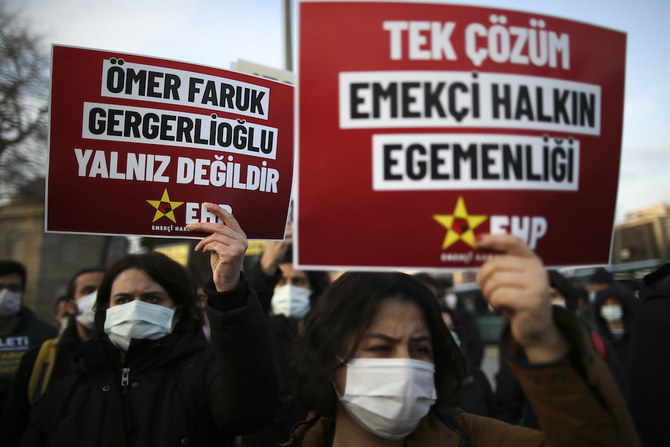
- “In the past, closure cases were opened against parties for supporting terrorism,” Justice Minister Yilmaz Tunc told reporters in Ankara
- “Therefore, we say that if the DEM Party follows the same path, then it will face the same treatment”
ISTANBUL: Turkiye’s justice minister warned the country’s main pro-Kurdish DEM party on Wednesday that it would face the risk of legal action, and even a closure case like its predecessor, if it did not distance itself from Kurdish militants.
DEM, parliament’s third largest party, was established last year as a successor to the Peoples’ Democratic Party (HDP), which is facing the prospect of closure over alleged militant links in a court case following a years-long crackdown.
“In the past, closure cases were opened against parties for supporting terrorism,” Justice Minister Yilmaz Tunc told reporters in Ankara, noting that some parties had been banned and that other cases were ongoing.
“Therefore, we say that if the DEM Party follows the same path, then it will face the same treatment,” he said. “We say keep your distance from terrorism if you do not want to face such a legal process.”
Another court had been expected to announce a verdict this month in a case trying jailed former HDP leaders and officials over 2014 protests triggered by a Daesh attack on the Syrian Kurdish town of Kobani. That verdict was postponed.
“They should not wag their fingers at us. I repeat, the policy of closure, blackmail and threats is over,” DEM Party co-chair Tuncer Bakirhan said on Wednesday in the wake of a call from a government ally to ban the DEM Party.
Critics say Turkish courts are under the influence of the government and President Tayyip Erdogan, which he and his AK Party (AKP) deny.
Both prosecutors and the government accuse the HDP of ties to the militant Kurdistan Workers Party (PKK), which is deemed a terrorist group by Turkiye, the United States and European Union. The HDP denies having any connections with terrorism.
The PKK launched an insurgency against the Turkish state in 1984 and more than 40,000 people have been killed in the conflict. A peace process between Ankara and the PKK fell apart in 2015 and in a subsequent crackdown on the HDP thousands of its officials and members have been arrested and jailed.
UAE, Bahrain call for joint work to contain tensions threatening regional stability
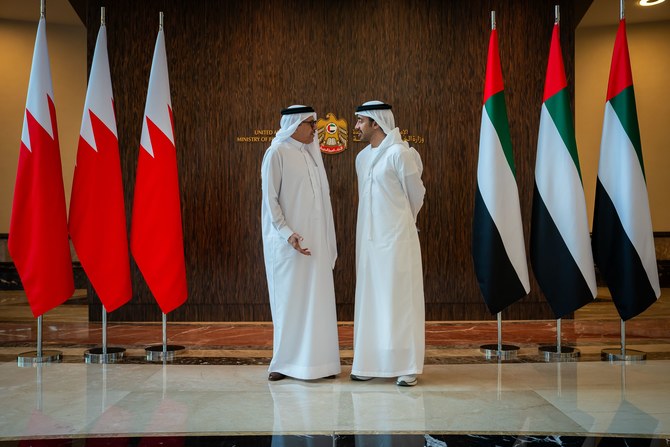
- During a meeting in Abu Dhabi, the ministers discussed the fraternal relations between UAE and Bahrain
DUBAI: UAE Minister of Foreign Affairs Sheikh Abdullah bin Zayed Al Nahyan received his Bahraini counterpart Dr. Abdul Latif bin Rashid Al Zayani in Abu Dhabi on Wednesday.
Sheikh Abdullah bin Zayed welcomed the Bahraini Foreign Minister, and during the meeting held at the ministry’s headquarters in Abu Dhabi, they discussed the fraternal relations between the two countries, and ways to enhance Emirati-Bahraini cooperation at various levels, WAM reported.
Sheikh Abdullah stressed during the meeting that the UAE and Bahrain are linked by historical relations that are becoming more established, developed and growing, and that they also constitute an important tributary to joint Gulf and Arab work.
He also stressed that the current challenges facing the region require intensifying cooperation, coordination and joint work to contain all tensions that threaten its stability, security and safety of its people.



